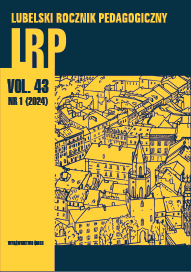W STRONĘ NOSTALGICZNEJ LEKTURY LITERATURY
DZIECIĘCEJ W DYDAKTYCE AKADEMICKIEJ
TOWARDS NOSTALGIC READING OF CHILDREN’S LITERATURE IN
ACADEMIC TEACHING
Author(s): Monika KupiecSubject(s): State/Government and Education, Theory of Literature, Sociology of Literature
Published by: Wydawnictwo Naukowe Uniwersytetu Marii Curie-Sklodowskiej
Keywords: children’s literature; nostalgic reading; infantilization; critical reading; academic teaching;
Summary/Abstract: Introduction: The need to recognize the student’s way of reading children’s reading is relatedto planning the development in the course of academic education of important methodologicalskills of the future teacher of early education (selection of literary texts, organization of workwith the text). Every early childhood teacher is a nostalgic go-between for children’s literature.Research Aim: The aim of my own research is to identify students’ opinions about selected textsof children’s literature. Particular attention was paid to identifying revealed reading strategies.Method: The method of personal documents was used. The impulse that triggered students’ re-flection on their own opinion about a children’s book was writing a review of a selected reading.Results: 41 student statements were collected. Among the reviewed items, the vast majority(in 31 reviews) were literature considered classic, which has been included in the recommen-dations of the core curriculum for years. The analysis shows that 14 people read the reviewedbooks in childhood and declared that they read them again in their adult life. The analysis ofstudents’ choices reveals a lack of knowledge of children’s books published after 2006, i.e. duringtheir early education. The most frequently activated strategy of receiving children’s literatu-re – regardless of the baggage of experience related to reading a given book in childhood – isinfantilizing reading.Conclusion: Without identifying the strategy of reading children’s literature, future teacherswill not be able to participate competently in the child’s literary communication, even withpersonal “reading”. Intensifying the critical reading of children’s literature in academic classesfor future teachers of early childhood education seems to be a good way to collect readingexperiences and prepare for the role of a mediator of reading. Critical reading activities can beintensified in the activities of circles, laboratories and children’s book discussion clubs for futureteachers of early childhood education.
Journal: Lubelski Rocznik Pedagogiczny
- Issue Year: 43/2024
- Issue No: 1
- Page Range: 161-175
- Page Count: 15
- Language: Polish

